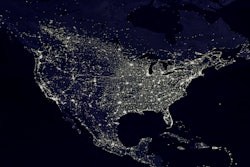Soybeans fell 3 cents a bushel in the night session after see-sawing between positive and negative territory in the overnight session. In Brazil, little has changed in the forecast since Friday. Most of Brazil will get rain at one time or another during the next two weeks. Far southern Rio Grande do Sul, eastern Bahia, northern Espirito Santo and northeastern Minas Gerais may be driest and will experience some net drying conditions. Overall, the situation will be favorable for summer crop development. Some pockets of dryness will be possible in each of these next two weeks, but the drier areas will move around from one week to the next and that is what will maintain the very good production potentials. Late soybean and early season corn planting may lead to reduced second season corn planting in 2016, but the main season soybean crop and early corn crop will still yield well if conditions remain as good as they have been lately.
In corn, Argentina weather will remain favorable for a while, but limited rain and warm temperatures will slowly deplete topsoil moisture and that might eventually slow planting, germination and emergence. Mid-month rain will be very important for the nation to sustain the best possible crop development potential. Rain in northwestern parts of the nation was welcome and brought some temporary, but immediate relief from dryness. South Africa is still too dry with weekend rainfall still too light to change soil or crop conditions. Rainfall will continue erratic and mostly light each day over the next two weeks. Localized areas of improvement are expected periodically, but most of the nation will remain much too dry.
U.S. equity markets looked to kick off the week on a muted note after a hefty rally on Friday fueled by a better-than-expected November jobs report. The Labor Department’s report of 211,000 new jobs created last month still hung with Wall Street on Monday after a blockbuster rally on Friday, which tacked on more than 300 points, as traders bet the data helped give the Federal Reserve more confidence to hike short-term rates this month.
Crude oil prices continue their dramatic decline after a refusal by the Organization of Petroleum Exporting Countries (OPEC) to cut production. Some observers believe, however, that OPEC's production level is now less relevant to controlling oil prices, because burgeoning output from outside the cartel would fill in any cuts it made.
The risk of trading futures, hedging, and specualting can be substantial. Grain Hedge is a dba of Foremost Trading LLC (NFA ID: 0307930)









